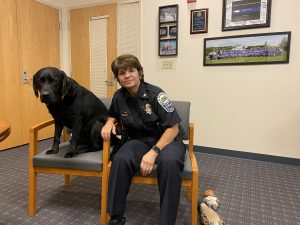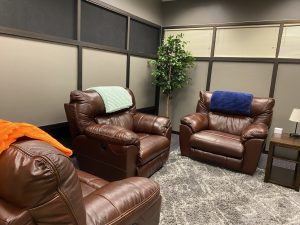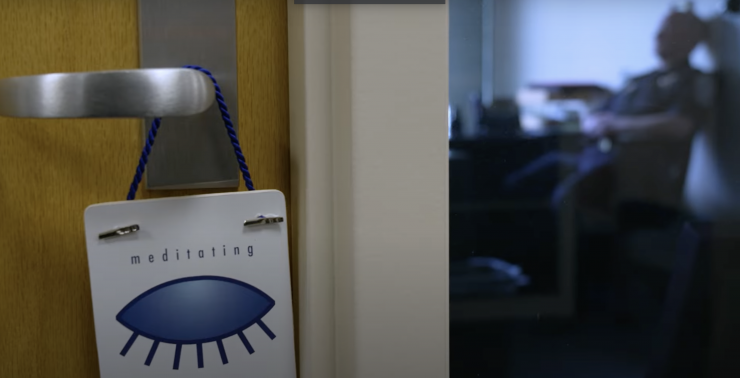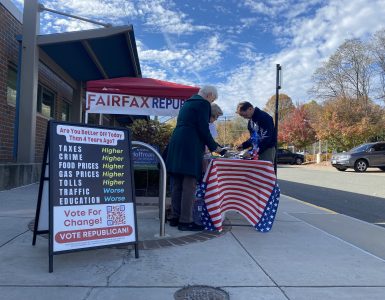Transcendental Meditation Instructor Lea Cho said she had taught mindfulness to all kinds of people: Doctors during the pandemic, victims of violence and children learning in D.C. schools.
But in 2020, she tackled teaching a new and unexpected group of first responders: Officers from the Herndon Police Department.
“It was a lot of fun, especially with this group, because they’re just really good people,” said Cho, who has taught meditation for four years. “They feel like family at this point.”
Herndon police is the second department in the country after the New York Police Department to participate in a pilot program that teaches cops how to meditate. Instructors have taught meditation four times in the last two years to Herndon officers. The goal: To better community policing amid nationwide calls to defund law enforcement.
The comfort of calm
Herndon’s meditation program is funded by the David Lynch Foundation, a nonprofit dedicated to teaching people transcendental meditation.
Transcendental meditation is a form of silent mantra meditation, according to the foundation. Unlike other forms of meditation, people who practice it do not need to monitor their thoughts or focus on a specific manifestation.
Bob Roth, chief executive officer of the foundation, said the foundation raises money for a four-day training from community donors in the Washington, D.C. area.
Roth said the training for Herndon police is not different from the training they would give to anyone else. The pilot project indicated that this universal technique could help officers among other first responders, he said.
“When a person has been traumatized, they have been traumatized,” Roth said.
Herndon Chief Maggie DeBoard said she did not expect the training to work at all.
“I definitely had expectations like, ‘This is not going to do a darn thing for me,’” DeBoard said. “I mean, I had trouble wrapping my brain around the fact that I’m supposed to sit down for 20 minutes and just repeat a mantra so that this would have an effect on my brain.”
DeBoard said Cho and the other instructors proved her wrong.

“It doesn’t eliminate stress, but it helps you cope with the stress that you’re dealing with,” DeBoard said. “It helps you feel more in control of the problems.”
Roth said many people who take the training have the same realization.
“A real warrior is a person who can maintain an inner calm, inner equanimity in the midst of powerful dynamic activity,” Roth said. “So, this doesn’t make a person passive. This allows the person to marshal their energy and the resources to respond to any situation at any time.”
DeBoard said she learned meditation at the most challenging moment of her life. She said officers were leaving her department in droves after the 2020 killing of George Floyd and the defunding of the police movement. Herndon is still down six positions in their 50-officer department, she said.
“That nearly broke me,” she said. “Meditation was a savior for me because it allowed me to realize that I can manage this.”
DeBoard also said she brought meditation to the department because she wanted to better her officers’ relationship with the community. DeBoard wants to better her department after community calls for police reform in Virginia.
“The crux of reform is, ‘Do we have good, healthy cops?’” DeBoard said. “And if we have good, healthy cops, then we’re ultimately likely to have much healthier community interactions.”
DeBoard said she doesn’t mandate officers take the meditation training. But she tells officers, however, that they should develop skills to help them cope with their job.
“Sometimes, you deal with people on the worst day of their lives, and you’re supposed to deal with it, but you have to be humbled about the fact that it’s going to impact you,” DeBoard said. “If it doesn’t impact you, you’re in the wrong job because you have no heart.”
A new department
The Herndon police department looks slightly different since it brought transcendental meditation to its ranks. Officers can meditate at the station’s nap room or wherever they feel comfortable while working their shifts, DeBoard said.

There are 48 officers in the department, DeBoard said. Lisa Herndon, department spokeswoman, said 14 officers and 13 professional staffers took one of the four training sessions.
Capt. Justin Dyer did the first session back in 2020. He said meditation changed his life.
“I wasn’t very open-minded about it,” Dyer said. “I thought it was a bunch of Voodoo because I was closed-minded, put it that way. Coming out of it, I had a totally different perspective.”
Dyer said people might have preconceptions about meditation, but he learned a lot about how the practice can help first responders.
“It’s not a cold-type thing,” Dyer said. “It’s not a belief system. It’s just a way to rework how your brain operates. And it just gets rid of stress.”
Cho, the instructor who taught transcendental meditation to police, said many people often had that realization in training. Cho said police officers would never stop being human, nor should they be expected to do that.
“It’s not that you stopped having challenges in life,” she said. “It’s not that you stop having emotions. You know, and that’s never the goal. The idea is that when stuff does happen, you’re able to bounce back faster.”















Add comment